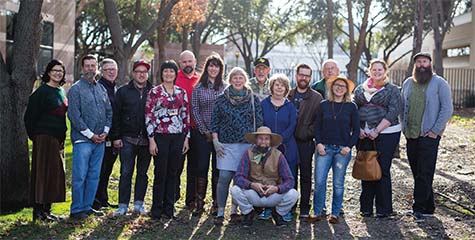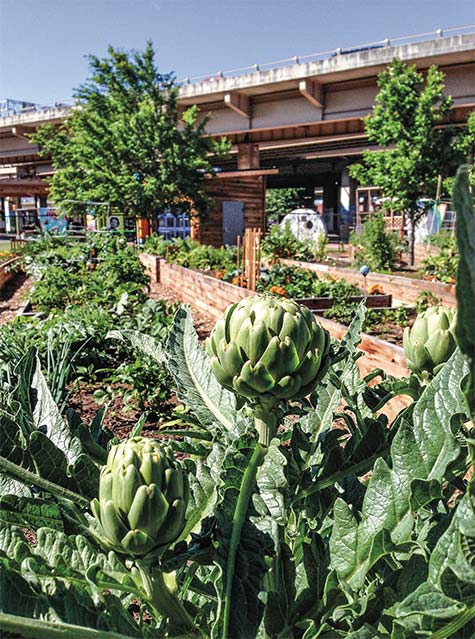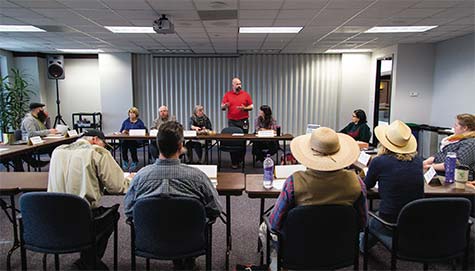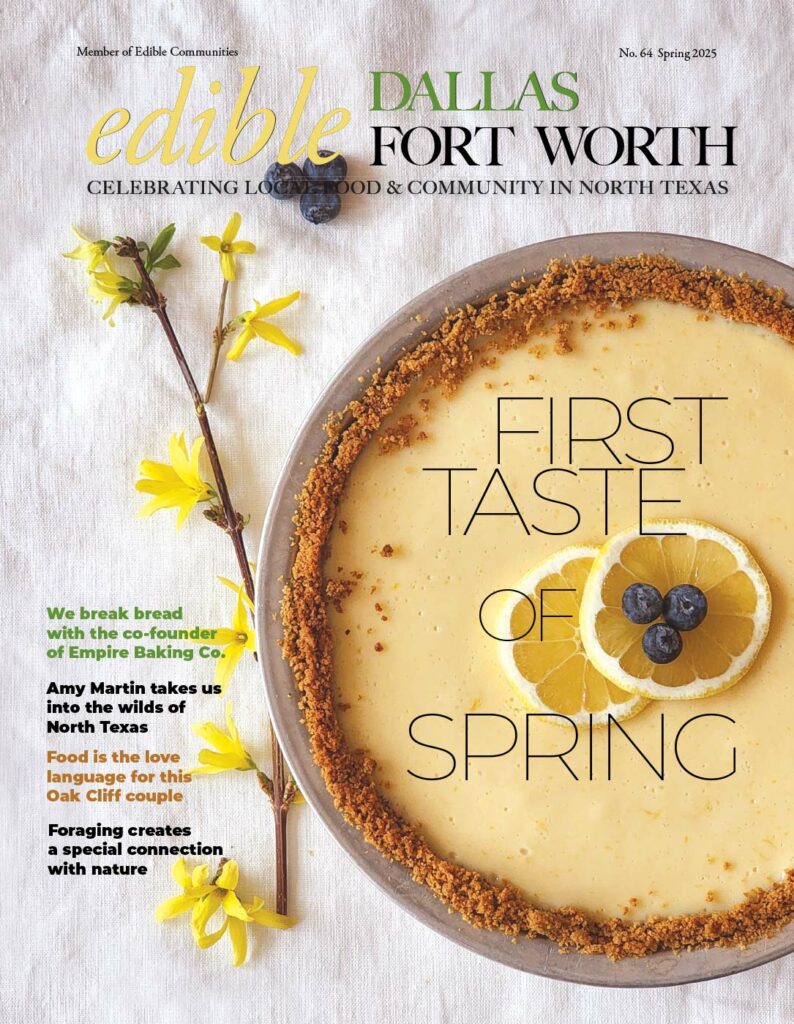 Left to right: Wyonella Henderson-Greene, Texas Hunger Initiative;
Left to right: Wyonella Henderson-Greene, Texas Hunger Initiative;
Bob Ritchie, Trinity Valley Beekeepers Association; Bob Curry, City of Dallas;
Issac Cohen, bC Workshop; Helen Dulac, City of Dallas;
Kevin Lefebvre, City of Dallas; Susie Marshall, GROW North Texas;
Susan and Brandon Pollard, Texas Honeybee Guild;
John Talbert, Texas Beekeepers Association;
Linda Nickerson, Lake Highlands Community Garden; Mark Wootton, Garden Cafe;
A.L. Nickerson, Lake Highlands Community Garden;
Liz Goulding, adjunct professor, El Centro College;
Valerie Miller, City of Dallas; Chad Julka, GROW North Texas/Dallas Farmers Market.
Photo by Elisa Fisher.
“I might not be smart enough to understand this,” says a business-suited gentleman to another. Along with other city officials and local food advocates, the two are at Dolphin Heights Community Garden near Fair Park, huddled around a thin, elderly gardener as he explains how he turns the compost. It’s 17°F out, but no one seems to mind. They’re too busy checking out the garden beds, many of which are still producing greens. For some, it’s their first time to see urban agriculture in practice.
The morning-long tour is part of an ongoing collaboration between city officials and activists who hope to stimulate agricultural endeavors in Dallas. Community gardens and urban farms are key components to bringing healthy, affordable food to all parts of the city. In 2014, a broad coalition of farmers, gardeners and local food activists were invited by the Dallas Coalition on Hunger Solutions to look at ways to make urban food production more accessible. The resulting Urban Agriculture Action Team began a partnership with a variety of city staff and elected officials, who have been reviewing zoning codes, looking to revise those that unduly suppress gardeners and small-scale farmers.
In recent years, increased interest in urban agriculture has begun to rub against the language of a city code that has been around for half a century. The Action Team quickly realized that the best use of their knowledge would be to recommend specific zoning changes and help city officials understand the reasoning behind such changes. As Kevin Lefebvre with Dallas’ Office of Environmental Quality puts it, “The city code was written a long time ago. And like anything else, times change, people change, needs change. We can’t keep thinking that past models will sustain us into the future. City leaders know that and are looking for ways to bring us up to speed on a lot of issues including urban agriculture.”
Understanding zoning codes and recommending changes is a bit like taking a mechanical clock apart and trying to put it back together using instructions written in another language. It’s tedious, and there is a lot of nit picking involved. Do raised beds and protective hoop houses count as structures? Should we eradicate weeds in a garden or on an urban farm the same way we treat them in our yards? Taking time for visits like the garden tour has helped officials better understand the issues limiting growers and decipher which public concerns are real and which are built on misconceptions.
The momentum for change has gained strong support from council members on the Economic Development Board and staff from the Office of Environmental Quality. The actual construction of an ordinance amendment must go through the Zoning Ordinance Committee, then the City Planning Commission, and finally a vote by the city council.
After WWII, community gardens fell out of favor throughout the country. But during the ’90s, Dallas found a champion in former Peace Corps volunteer Don Lambert, who created a network of gardens for newly arrived refugees. The gardens have endured and provided powerful lessons on helping others help themselves. “All of us working on making urban agriculture more accessible stand on the shoulders of Don’s work as an example of the positive impact growing food can have,” says Action Team leader Susie Marshall, who’s also Executive Director of GROW North Texas, a nonprofit dedicated to cultivating healthy food communities.
 Deep Ellum Urban Gardens
Deep Ellum Urban Gardens

“We can’t keep thinking that past models
will sustain us into the future. City leaders
know that and are looking for ways to
bring us up to speed on a lot of issues
including urban agriculture.”
A 2010 code amendment, allowing community gardens as the first use on a property, resulted in some new gardens but growth was less than anticipated. Upon its formation in 2014, the Urban Agriculture Action Team began looking into why new endeavors never materialized. The group came to the conclusion that the size requirement and ambiguity on the legal status of produce sales were huge roadblocks for would-be farmers.
Currently, the city makes no allowance for a farm, unless it’s at least three acres. “Most people don’t have that kind of land or capital,” says Marshall. “Growing your own food is empowering and a transformative experience, and changes in code are needed in response to what the community wants. People want to be able to grow food more easily and sustainably.”
Much of the current interest is focused on small operations in areas of South Dallas, where there is available land and few grocery stores providing fresh produce. Groups like the Revitalize South Dallas Coalition have been involved with the Action Team because they see small commercial farms as a key component to promoting economic development and job creation in that area.
Dayna Cowley from the Office of Environmental Quality looks forward to a city that has the capability to feed itself. “I’m excited about the economic potential behind food. How great would it be if we had a local food hub in South Dallas? A place where local farmers could bring their food and then sell it to people all over the city— that would be my dream come true.”
Aquaponics is another area of great interest for the Action Team. Several individuals are interested in beginning commercial aquaponics operations, but have waited to act because their legality is in question. This type of system involves fish or other aquatic animals that feed the plants with their waste. The plants then clean the water so it can be reused again in a closed loop. No soil is required, making this type of agriculture operation ideal for urban environments.
Food entrepreneurs inspired by the work of people like Milwaukee food activist Will Allen, the founder of Growing Power, see unwanted commercial space in places like South Dallas as acres of productive real estate, ready to be activated as farms that could supply restaurants and nearby residents with fresh produce year-round. Much of the specific language in the amendment is still up in the air as parameters are being debated and refined. The hope is to have a completed amendment before the council by May, which is the end of the current term. After that several council members will step down due to term limits, and it would be necessary to address new members’ questions and concerns.
Lefebvre encourages all Dallas citizens to speak out to their council members. “Before, there wasn’t a concert of voices working in unison. Now we are hearing from a whole group of people at once and that type of action has a dramatic effect. We have great momentum now, but because the ultimate decision is up to the council, it’s incredibly important for people from all districts to speak out and make their voices heard. City officials really do want to know what you think.”
Marshall is hopeful that the time is right for substantive change in the way the city addresses urban agriculture. “The number and variety of people involved in this project has been really encouraging. There are some great relationships being built between city staff and Action Team members that will carry us into the future. Urban agriculture takes on a unique identity in every city, and I think in the coming years we are going to get a chance to really see what that looks like for Dallas.”
LIZ GOULDING teaches biology at El Centro College and is a freelance writer based in Dallas. She has previously worked for Urban Acres, Holistic Management International and served as chapter leader for Slow Food Dallas. She is currently focused on the stories behind local food producers and artisans, and the ways that food unites families and communities.
- Liz Gouldinghttps://www.edibledfw.com/author/lgoulding/
- Liz Gouldinghttps://www.edibledfw.com/author/lgoulding/









